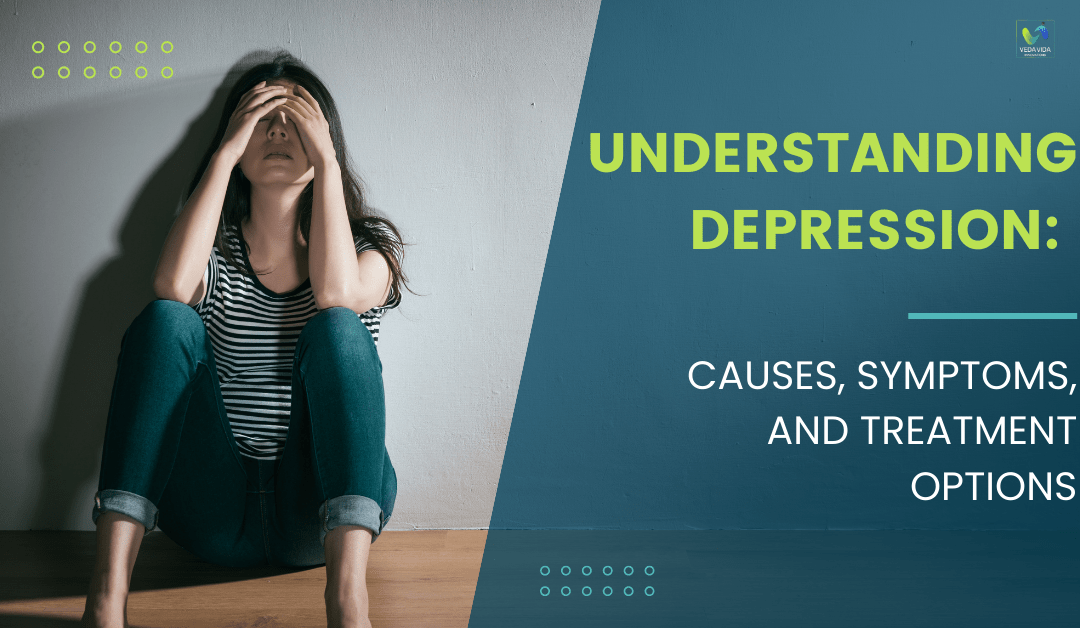
Understanding Depression: Causes, Symptoms, and Treatment Options
Depression is a mental health condition that affects millions of people worldwide. It’s more than just feeling sad or down for a brief period. Depression can impact every aspect of a person’s life, from their daily activities to their relationships and overall well-being.
There are various symptoms associated with depression, which can be categorised into four areas:
- Behavioral symptoms may include irritability, restlessness, withdrawal from activities, and even suicidal behavior.
- Physical symptoms may include fatigue, changes in eating patterns, and digestive problems.
- Cognitive symptoms may include negative thoughts, difficulty concentrating, and slow thinking.
- Psychosocial symptoms may include feelings of worthlessness, anxiety, and low self-esteem.
Depression can be classified into three major categories.
- Major depression is the most severe form of depression and can disrupt a person’s ability to function normally in daily life.
- Minor depression is a milder form of depressive symptoms that impact one’s overall sense of well-being.
- Dysthymic disorder, or dysthymia, is a chronic form of depression that impairs daily living activities for two years or longer.
Common Causes of Depression
Many of us do not realise the severity of a person dealing with depression. It is a serious medical illness and is becoming increasingly common nowadays. Several factors contribute to a person’s depression, but the common causes of depression are:
- Genetics: Depression is more prevalent in people whose blood relatives also have this condition. Researchers are trying to find genes that may cause depression.
- Brain chemistry: Neurotransmitters are naturally occurring brain chemicals that likely play a role in depression. Recent research indicates that changes in the function and effect of these neurotransmitters and how they interact with neurocircuits involved in maintaining mood stability may play a significant role in depression and its treatment.
- Hormones: The imbalance of hormones may cause or trigger depression. Hormone changes can occur during pregnancy and in the weeks or months after delivery (postpartum) and from thyroid problems, menopause, or other conditions.
- Lifestyle causes of depression:
- Stress: Stress overwhelms a person’s ability to cope and can cause depression. Researchers say high levels of the hormone cortisol, secreted during stress, affect the neurotransmitter serotonin and contribute to depression.
- Circadian rhythm disturbances: One type of depression, called seasonal affective disorder, is believed to be caused by a disturbance in the body’s normal circadian rhythm. Disruptions in circadian rhythm can also lead to a drop in serotonin and alter melatonin levels in the body, which influence mood and mental health like depression.
- Poor nutrition: A poor diet can contribute to depression in several ways. A variety of vitamin and mineral deficiencies are known to cause symptoms of depression. In addition, diets high in sugar have been associated with depression.
- Substance use: Drug and alcohol use can contribute to depressive disorders. Even some prescription drugs have been linked to depression.
Depression can be cured naturally:
Even minor depression can be dangerous if left untreated, leading to a person attempting suicide out of depression. But the good news is that depression can be treated naturally. Some Ayurvedic herbs known for their benefits in mental health include Brahmi, Ashwagandha, Shankhpushpi, Jatamansi, and Tulsi. These herbs are believed to improve mood, reduce stress and anxiety, and promote mental clarity. By using Veda Vida’s herb-based capsules, which contain these and other Ayurvedic herbs, you can overcome your depression symptoms without harmful side effects. These natural remedies have been used for centuries to promote mental health and well-being, and they may be a helpful addition to your depression treatment plan.
In conclusion, depression is a complex medical illness with a variety of contributing factors. Understanding the role of neurotransmitters and hormones in depression can help inform treatment options and lead to more effective outcomes for those struggling with this condition. If you or someone you know is experiencing symptoms of depression, it’s important to seek professional help and support to address the issue and improve overall mental health and well-being. Remember, depression is a treatable illness, and with the right support and care, recovery is possible.